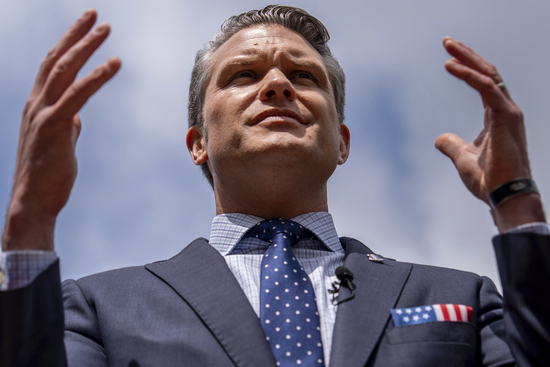In his continuing embrace of toxic masculinity, President Donald Trump supported the idea on Monday of changing the name of the Department of Defense to the “Department of War.”
The suggestion came up during Trump’s rambling speech to reporters in the Oval Office as he signed an executive order meant to restrict free expression by outlawing flag burning.
Trump said the current department name “didn’t sound good,” and he praised the name of a preceding agency, the Department of War, citing its usage during American victories in World Wars I and II. He said the Department of War “had a stronger sound” and that Department of Defense “sounded bad.”
“Defense? I don’t want to be defense only. We want defense, but we want offense too,” he added.
A name change will have to go through Congress and can’t just be based on Trump’s whims, similar to his ongoing claim that the Gulf of Mexico is the “Gulf of America.”
Of course, contrary to Trump’s characterization, the United States has initiated multiple wars around the world since it established the Department of Defense in 1947. The usage of “defense” in the moniker didn’t prevent the launch of wars in Afghanistan or Iraq, for instance, and it didn’t prevent Trump from initiating air strikes against Iran, either.
The rhetoric is the latest example of Republican leaders attempting to assert a false machismo. Secretary of Defense Pete Hegseth has been one of the most notorious promoters of this, arguing that the department he leads should be about warfighting and little else.
The Department of Defense was established by the 1947 National Security Act, which was passed in the wake of World War II, a global conflict where millions died under leadership—most notably in fascist Germany, Italy, and Japan—that expressed Trump-style ideals about machismo.

The National Security Act intended to streamline and formalize the organization of America’s military, consolidating leadership under the secretary of defense. The secretary—in theory—works as an expression of the president’s ultimate control of the armed forces, making it clear that in America the military is civilian-led and subordinate to the civilian leadership.
Trump is part of the Republican tradition of joyfully bombing people, particularly if they are brown-skinned, and he has often shunned the role of a strong defense in ensuring global peace. Yet, at the same time that he is so concerned with saber-rattling, he continues to undermine the troops, both active duty and veteran.
His administration has worked to undercut the ability of the Department of Veteran Affairs to respond to veteran health care needs. And Trump derides active-duty troops and has described real injuries they have received in combat situations on his watch as merely “headaches.” Trump has reportedly referred to deceased military heroes as “suckers” and “losers.”
Just last week, Trump called himself a “war hero,” effectively mocking true heroes who have served in combat in multiple war theaters. Of course, he never served, instead using his family’s wealth as a path to avoiding military service during the Vietnam War.
Renaming the department to a more aggressive moniker won’t undo what Trump has said and done, but the point was always to look like a tough guy.
